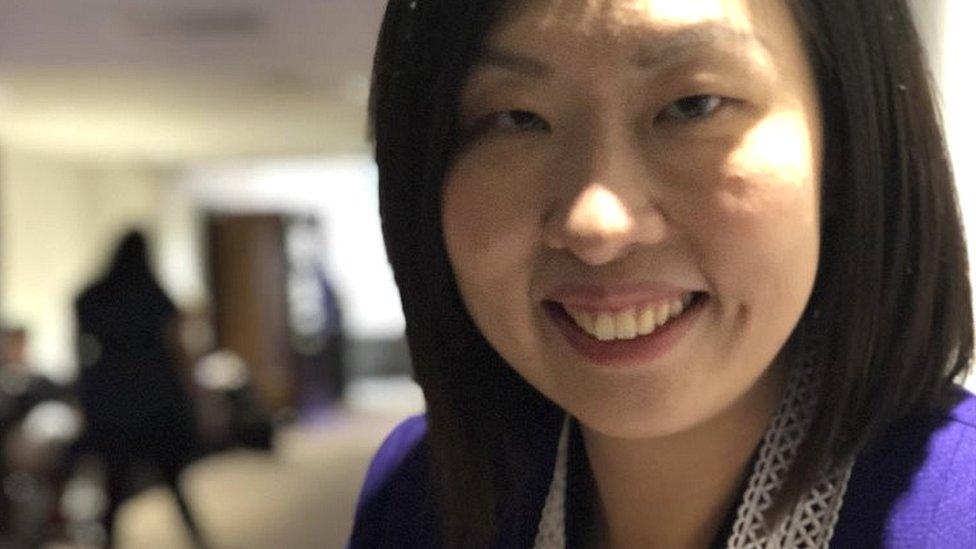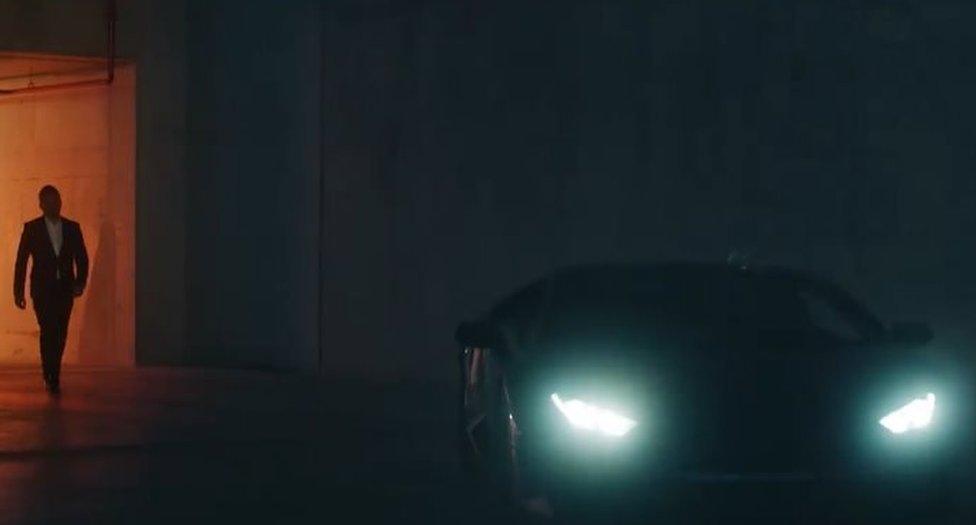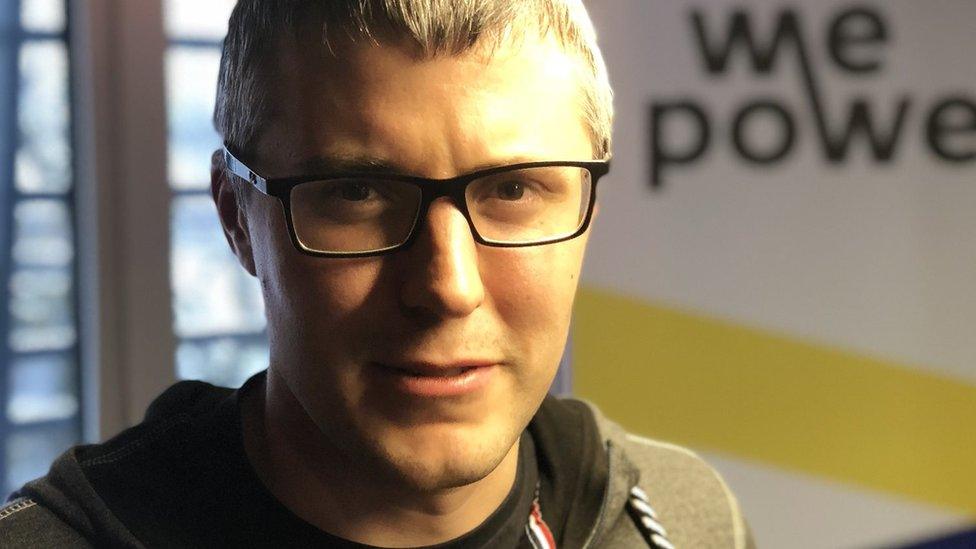Magical Money - the ICO crypto-currency boom
- Published
- comments

Ms Lim's internet dating project has not gone as smoothly as hoped
Violet Lim wants to get rich by marrying together internet dating and the latest investment craze.
"Our ICO is about love on the blockchain," the founder of Viola.ai exclaims.
"You can use it to get curated matches, to buy flowers, to book restaurants or even get dating and relationship advice."
ICOs - or initial coin offerings to give them their full name - are a way to raise funds by creating a new form of money from thin air.
And in the radio documentary Magical Money we try to find out whether this is a revolution in finance or a bubble that is already bursting.
Singapore-based Violet has been involved in the internet dating industry for years.
But she believes an ICO presents a way to raise $17m (£12.6m) from investors, who will get tokens to use in their dating activities.
Why, I want to know, do you need a token to buy flowers for your loved one and why does the service have to be on this magical blockchain which apparently solves every problem?
"We are trying to solve a very important problem in our industry, which is the lack of trust," she replies.
And she explains that by entering people's details on an immutable blockchain, Viola will be able to deal with "love scammers" who hide their true identity.
But her enthusiasm gives way to a degree of despondency soon after, when Google bans crypto-currency and ICO ads on the very day Viola's public sale gets started.
"[It's been] a very bad first day followed by a very bad first week," a more muted Violet tells me.
Exotic cars
Violet is one of dozens of ICO-dependent company founders we first met at an event called London Blockchain Week in January.
They were all convinced of two things: that fashionable blockchain technology could revolutionise just about every industry on earth, and that huge profits could be made by creating new currencies to fund this wave of disruption.
"There's a craze going on," says the event's organiser Luis Carranza.
"It might be a hype cycle, but it also could be the beginning of a new industrial revolution."
He explains that an ICO involves both creating a new crypto-currency or token like Bitcoin and Ethereum, and selling investors on the idea that these coins will be the foundations on which radical new blockchain projects will be based.
In the programme we follow Viola's fortunes as well as those of another project.
"Bitcar is a new decentralised platform," explains founder Gov van Ek.
"And on there will be high-end exotic cars and people will be able to acquire a fractional interest in those cars."

Bitcar's promotional materials feature high-end vehicles and the promise of being able to own "fractions of" an exotic car
Investors will never be able to drive the McLarens and Ferraris that Bitcar will one day acquire.
But the idea is that the tokens they obtain via an ICO aiming to raise $25m (£18.5m) will rise in value along with the automobiles.
A belief in the power of blockchain - essentially a database shared across multiple computers where every new entry is added to an unchangeable log - has seen billions of dollars invested in ICOs over the past 18 months.
But finance blogger and former banker Frances Coppola has a warning: "I'm not saying there isn't value in blockchain, but the way it is getting hyped is ridiculous."
We asked her to look at the Bitcar and Viola ICOs, and she was not impressed.
Of Viola she asked: "What's the point?"
And she was not convinced by Violet Lim's assertion that the blockchain would make dating more secure
"Why on earth would I want my entire dating history up on a public blockchain where everyone could see it?"
Turning to Bitcar, she insisted the fractional car ownership scheme was no more or less than a derivatives market with all the risk that entails.
"If people want to gamble on tokens that might or might not have some hard asset backing which might or might not go up in value, then by all means don't stop them - but it's a derivative."
In Magical Money we also travel to one tiny country that is so enthusiastic about ICOs that even the government has considered having one.
Or rather the smart young group of officials that came up with Estonia's e-residency programme, which allows anyone to set up a business in the country, have now floated the idea of a crypto-currency called Estcoins.
One of the team tells me the Estcoin concept had flown higher than they had ever thought possible - but reaction was mixed.
"Mostly people wanting to invest - but there was a lot of criticism from high government officials," explains Ott Vatte.
The country's central bank pointed out last year that Estonia was part of the eurozone, and so an alternative currency was a non-runner.
The Estcoin team has hastily dialled down its ambitions, planning to make their currency a kind of loyalty scheme for the businesses in the e-Residency scheme.
But it has also helped throw the spotlight on Estonia as a location for successful ICOs.

Tallinn has been associated with tech ever since Skype was established there
One of them is WePower, which raised $40m for its blockchain-based renewable energy trading platform.
The firm's chief technology officer has a more traditional business background than many in the ICO world, having joined from an Estonian energy utility.
Kaspar Kaarlep says an ICO was the only option for getting the company off the ground.
"Today's capital markets are very difficult," he says.
"I would even say doing an ICO if you want to do something big in the energy market is the only way to fund it."
He admits that ICOs have a reputation issue but says it is early days, comparing the scene to the late 1990s when all sorts of weird and wonderful dot-coms got funded.

Mr Kaarlep's company allows renewable energy providers to raise money by issuing their own tokens
Placed on hold
The trouble is there is both a startling level of fraud and a high failure rate - a study by a crypto-currency news site, external found that nearly half of 2017's ICOs had already failed.
Regulators are taking a closer interest in these schemes and potential investors are being warned that there is a good chance they will lose all of their money.
So, a couple of months after meeting them at London Blockchain Week we contacted our two featured ICOs to see how they were doing. Both had suffered setbacks.
Gov van Ek tells us that Bitcar has only raised $9m of its $25m target.
"We're not disappointed with that," he insists. "It's more than enough to get our platform and our vision going."
He accepts that a lot of people are losing faith in the crypto-currency market but - like everyone else I've met on the ICO scene - he is confident his project will be one of the survivors.
As for dating-on-the-blockchain Viola, its founder and her team have decided to "pause" the sale and are monitoring market conditions to see when will be a good time to restart.
Perhaps these and other ICOs will go on to raise lots of money, transforming entire industries.
Or maybe magical money will prove to be magical thinking and the ICO bubble will burst, leaving thousands of investors poorer and wiser.